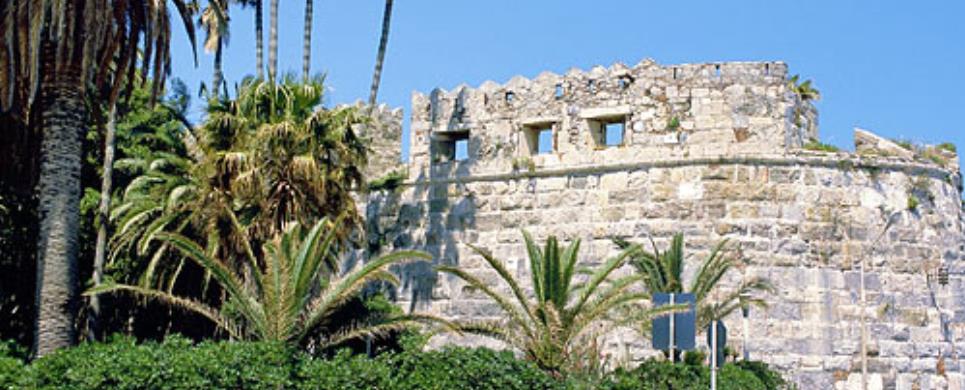Listed 2 sub titles with search on: Sights for wider area of: "KOS Town DODEKANISSOS" .

KOS (Town) DODEKANISSOS
It is situated in the
entrance of the Kos harbour
on a place where, in antiquity, there was an island, communicating with the inland through a brigde, that's still preserved
today (the bridge of the Phoenicians' street).
It is formed of two
defensive precincts.
The interior one has four circular towers in the corners; the southeastern tower forms part of the
exterior precinct,
which is larger than the first, with massive bastions on the four corners, battlements and gunports. The two precincts are separated
by a large moat and communicate with a drawbridge.
The castle
was built of local stone as well as
parts of ancient buildings
(columns, architraves, bases etc.) from the ruins of the ancient city.
On the upper part of its masorry, one can see many blazons.
Over the main gate
one sees an hellenistic frieze
with masks and garlands. On the gates' ceiling (central gate, Carmadino gate) there are basalt columns placed obliquely, which come
probably from the early christian basilica of Limen.
From travellers' descriptions, we know that the interior precinct was built a little before the end of the 14th century when the
sultan Bayazit I was attacking the city. The oldest remaining part of the castle is the circular tower to the left of the draw bridge, through
which the two precincts communicate, and bears the blazons of two Grand Masters: De Lastic (1437 - 1454) and de Milly (1454 - 1461).
The exterior precinct is posterior to the interior, its construction began in 1495 by the Grand Master D' Aubusson, continued by D' Amboise
and completed by Del Carretto in 1514.
On the northen side, between the two precincts, there was a warehouse made by the knights; it was restored during the
Italian occupation and today it is used as a museum, where one can see altars, sculpures and inscriptions.
KOS (Ancient city) DODEKANISSOS
It is said that under the shade of that tree Hippocrates taught his pupils Medicine. This plane is also considered as the oldest tree in Europe.
Receive our daily Newsletter with all the latest updates on the Greek Travel industry.
Subscribe now!